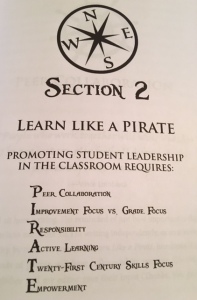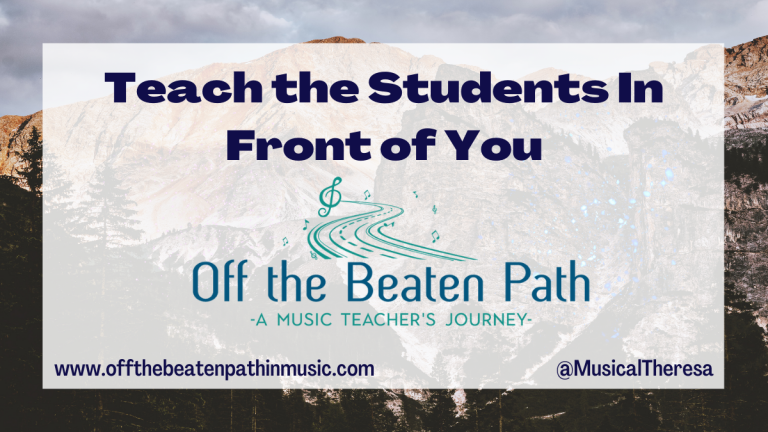LearnLAP – With a Musical Twist

It’s no secret that I love to read. I usually have several books going at once, and even blogged about some of my favorite books here: What am I Reading? One of the books on my “to-read this summer” list was Learn Like a Pirate by Paul Solarz. The author was conducting a book study on Twitter, and it seemed like a great reason to start.
Little did I know, PIRATE is an acronym! This was the first of the “Pirate” books I’ve read from Dave Burgess Consulting, but it definitely won’t be the last. The author’s quest towards a student-centered classroom was inspiring, and the PIRATE acronym perfectly fits what I am looking for in my teaching. I may even continue the pirate-theme throughout the year!
When looking closely at what PIRATE stands for, it makes a lot of sense in a music classroom. Here are some of my thoughts and plans for implementation this school year.
P – Peer Collaboration
 Students must have the opportunity to learn with and from their peers. Learning is social, and kids are social. The two go very well together. In the past, I have given students the option of practicing alone or with a partner, but one thing I plan to modify is a better explanation of how partner practice should look. Paul Solarz also talked about having “responsibility partners.” Students who were responsibility partners would sit together and bounce ideas off each other, but they were responsible for their own work. They would also hold each other accountable. In instrumental music, I could see this working well during practice time regardless of if students are practicing the same material. Just having someone specific to give feedback, answer questions, and check progress might be beneficial. Maybe the students could change responsibility partners each quarter?
Students must have the opportunity to learn with and from their peers. Learning is social, and kids are social. The two go very well together. In the past, I have given students the option of practicing alone or with a partner, but one thing I plan to modify is a better explanation of how partner practice should look. Paul Solarz also talked about having “responsibility partners.” Students who were responsibility partners would sit together and bounce ideas off each other, but they were responsible for their own work. They would also hold each other accountable. In instrumental music, I could see this working well during practice time regardless of if students are practicing the same material. Just having someone specific to give feedback, answer questions, and check progress might be beneficial. Maybe the students could change responsibility partners each quarter?
I – Improvement Focus vs. Grade Focus
YES! Improvement, rather than grades, is exactly how I want my students to think! The goal is to improve throughout the year. Last year I began using learning target (skills) assessments with my 5th-grade band and orchestra students. Students chose how many learning targets to focus on each quarter, and had options in how to show mastery of each skill. It was a great start on the personalized learning journey but still needs some tweaking. To continue towards having the focus be on improvement, I plan to start the year by having students fill out a “learning target inventory,” documenting how they feel about each skill – already mastered, somewhat familiar, not at all familiar. The students will complete an inventory at the end of every quarter, with the idea that they will see growth every quarter. Even if a skill is not mastered yet, knowing that it is a work in progress should help them see the improvement better.
When focusing on improvement, feedback (from both the teacher and peers) is essential. Paul mentioned teaching students how to give “quality boosters” as peer feedback. The students would first say, “I am going to give you a quality booster.” Next, they would give a specific compliment and follow that with a suggestion. Solarz recommends the suggestion be a question, rather than a statement. Doing this will make it seem less critical. I love this idea and definitely plan to use it.
R – Responsibility
Paul talks a lot about how the students run his classroom. He trains them to handle materials, schedule, and other daily tasks. Some are assigned jobs, while others anyone may be completed by any student. He also talks about the importance of rituals in the classroom, so there is no question about what needs to happen. I have thought about adding more jobs in my class. For the second half of last year, 5th graders had the opportunity to be “guest tweeters” during band and orchestra rehearsal. Two students were selected each day for this honor. They would be responsible for capturing our learning and composing a tweet which I would then post. I think other jobs could be added, such as a “librarian” to keep the books and music orderly, “tech support” to help students with iPad issues, or “supply chief” to distribute materials. I’ll have to brainstorm more, but I think some of these could work out – and be helpful! Someone on Facebook recently shared a quote by well-known conductor H. Robert Reynolds: “Only do what only you can do.” Meaning, if I am the only one in the classroom capable of doing something (conducting the band for example), that is what I should do. Anyone is capable of distributing music or straightening the chairs, so give those responsibilities to someone else.
It is important that students are responsible for their learning, and I like this idea too. Paul talked about a shared Google Doc where students would take turns writing summaries of a book they were reading. I could see something like this being useful for the pieces we work on in band and orchestra. A shared Google Doc where students could do their own “score study,” identifying challenges in the piece, offering suggestions, writing rehearsal recaps, etc. It could be included in a HyperDoc along with other relevant information. I plan to explore this idea more.
A – Active Learning
Active learning seems simple at first. As music teachers, most of us strive to have our students actively make music in class. This chapter did, however, make me contemplate activities that could be student-led and the incorporation of project-based learning. This is a good reminder to have students lead mini-lessons, warm-ups, and similar activities. That way students are not only making music but they are owning the process too.
T – Twentieth Century Skills Focus
Paul presents a comprehensive list of twentieth-century skills that make perfect sense for incorporation in the classroom. He divided these skills into ten categories:
- Communication and collaboration
- Creativity and innovation
- Critical thinking and problem solving
- Reflection and awareness
- Flexibility and adaptability
- Initiative and self-direction
- Social and cross-cultural skills
- Productivity and accountability
- Leadership and responsibility
- Information literacy
It’s an impressive list! While none are directly music related, I think anyone would agree with the value of all categories. I feel like most are already somewhat present in my classroom. One I want to focus on this year is reflection and awareness. I think more attention to reflection will help students become more purposeful in their practicing and critical in deciding when they consider a skill “mastered.” Teaching students to better reflect on their work and progress will be very valuable for them, especially since the focus for the year is on improvement (rather than grades). Many of the other twentieth-century skills will come naturally as the year progresses.
“For students to make constant improvements to their actions and accomplishments, they need to learn how to analyze themselves and each other, identify weak areas, and make plans to improve.” Paul Solarz, Learn Like a Pirate
E – Empowerment
If the other elements are in place, student empowerment will follow. When students are empowered, they own the learning process. Paul talked about things like Makerspace and Passion Projects, as both give students these opportunities. Last year the 5th-graders completed “Mozart Minutes” projects (our version of a genius hour) and I plan to continue that in some way this year as well. I work hard to empower my students. I want them to take ownership, to set goals, and to work towards achieving them. This is one of the most important things we can do for our students.
“When teachers empower students, the result is a higher enjoyment of learning, which leads to more motivation to work hard, which often leads to stronger achievement in class.” Paul Solarz, Learn Like a Pirate
I genuinely love the idea of my students learning like pirates this year! I think by focusing on the seven elements presented in the book we will be on the right track to have a student-centered classroom with empowered learners. There are no drastic changes required, and honestly, most ideas were things I was working towards anyway. Pulling everything together with “PIRATE” is just a way to think about it in one complete package. It should be a fun adventure!
LINKS FOR FURTHER READING:
The Qualities of an Empowered Music Student
Enjoy what you have just read? Please consider following my blog! You will get an email notification when new posts are published. Email addresses will not be shared or distributed.
Note: This post contains Amazon affiliate links. If you click on these links and buy, I will receive a small commission at no expense to you. The price of the books is the same whether you use my link or not. Think of it as a way to support Off the Beaten Path financially without spending extra cash. Thanks for your support!




